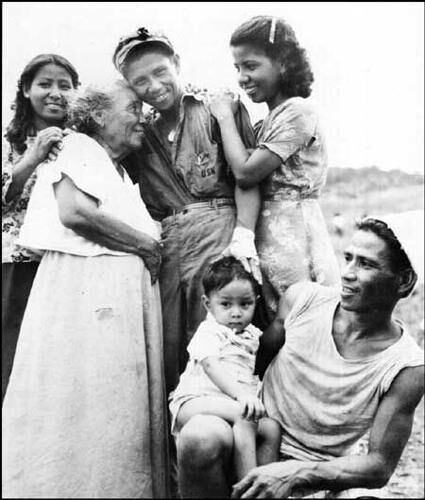HAGÅTÑA (The Guam Daily Post) — In just under three weeks since Liberation Day, The Atlantic published a book review of the novel “Mariquita: A Tragedy of Guam” which was published in the 1980s.

In this undated photo, Manuel Perez of the U.S. Navy receives a warm homecoming from his family as he returns to Guam for the first time in five years, as part of the liberating American forces. From left: his sister, then-24-year-old Mariquita; his then-71-year-old grandmother; and his then-23-year-old sister, Conchita. Kneeling is Perez’s brother, Jose Jr., and in his arms is the sailor’s nephew, then-2-year-old Jose III.
The novel was written by journalist Chris Perez Howard about his beloved mother who was killed during the end of the Japanese occupation on Guam during World War II.
The review was written by Lenika Cruz, senior editor at The Atlantic, who has familial ties to Guam. Cruz’s father is a CHamoru from Guam and she also lived on Guam during her childhood.
Cruz described the novel as “a gravestone made of ink on paper, built by a son for his mother.”
According to the review, Perez Howard’s novel is “considered the most widely read contemporary text from the often overlooked U.S. territory of Guam” where both authors have roots and ties.
In her review, Cruz recounted the book as being “part novel and part biography.” She continued, “’Mariquita’ follows the author’s Indigenous Chamorro mother, who was killed when he was a small boy during the World War II occupation of Guam by the Japanese,” the review stated. “She died just three days before American troops arrived; her body was never found.”
Perez Howard’s father was an American sailor stationed in Guam who was a prisoner of war and was held captive in Japan while his wife, young son and daughter were left to brave 31 months of Japanese occupation on the island.
Cruz described Perez Howard’s emotional work of remembering his mother as “intense and emotional.”
While the novel contains emotional tones, for Cruz, the “deeper meaning and what she found most moving” about the novel was that Perez Howard returned to Guam in 1979, she wrote.
When Perez Howard wanted to publish his work in Guam in the 1980s, there was not the means or resources to do so. Perez Howard was committed to having the novel printed on the island. He hired a typist and printer, which resulted in “the first run of 100 copies and rampant typos and poor binding,” according to Cruz’s review.
In her review, Cruz wrote, “At 113 pages, the book is too slim to be everything its author wanted it to be: family saga, war novel, love letter, historical text, anti-imperial cri de coeur.” However, she continued, “Perez Howard’s attempt to capture all of these moods and points of view only reinforces the unspeakable complexity of these wartime years for Chamorros.”
“Mariquita” is frequently described as a novel, however, according to Cruz, “it’s more accurately a work of fictionalized, yet heavily researched, biography,” she wrote. “It is also an illuminating, emotional, and at times disorienting read.”
Cruz explained that “Mariquita” “jumps between romance (when tracing Edward and Mariquita’s courtship), textbook (as it explains Guam’s colonial past), soap opera (during the sometimes-maudlin invented dialogue), and action thriller (providing an account of the fall of Guam),” in her review. Cruz continued, “Where some readers might see a frustrating lack of cohesion, I see authentic fragmentation and disorder.”
In 1986, the novel was published in Japan and later by the University of the South Pacific.










